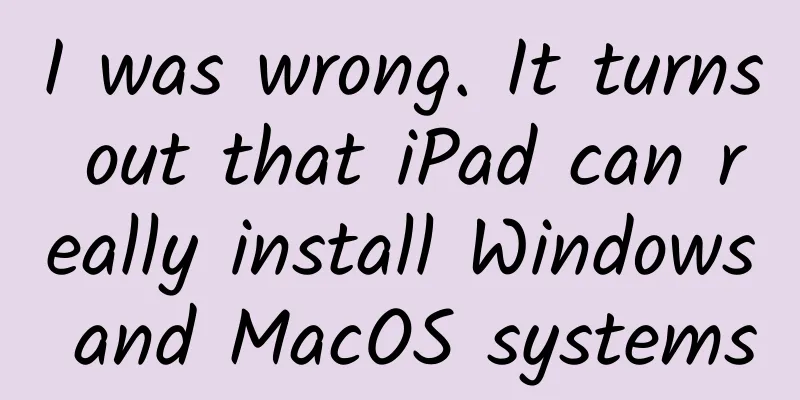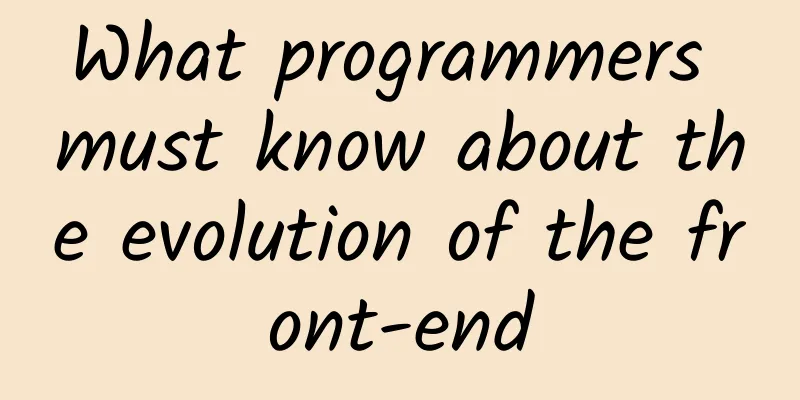I was wrong. It turns out that iPad can really install Windows and MacOS systems

|
To be honest, as a dual-user of Apple and Android phones, Shichao has thought more than once that it would be great if there was a phone that could support both iOS and Android operating systems. When you want to tinker with your phone, you can switch to Android. If you want to keep things simple, you can switch to iOS. If you get tired of the system, you can switch back and forth at any time. It’s great to think about having a dual system on your phone. Shichao originally thought that such a thing was impossible to achieve. After all, if the mobile phone can change the operating system, then who would buy an iPhone that is more expensive than Android just for iOS? However, recently, Shichao noticed that foreign developers have developed a virtual machine software called UTM, which can allow iPhone and iPad to run other systems without jailbreaking! And judging from the video posted by the blogger on YouTube, UTM currently supports running almost all common operating systems including Windows, macOS, Android and Liunx. Oh, what is productivity? This is the real productivity! This software has taken iOS and iPadOS to a new level. Can we really use an iPad to do things that we used to do on a computer? With such doubts, Shichao downloaded this software on 20 iPad Pro models, intending to use it to install several systems to try out and see what the experience of running other systems on iPadOS is like. It should be noted that because Apple has always prohibited virtual machine software from being listed on its own App Store, Shichao still installed UTM on his computer through a signing tool called AltStore. So, after reading this article, don’t go to the App Store to search. The search results will only show software with the same name. The official website of UTM is here: https://getutm.app/. Before installing the system, just like the common virtual machine software on the computer, after downloading UTM, we also need to download the image of the corresponding system. Since iPadOS will forcefully close apps that use more than 80% of the device's total memory, for the sake of conservatism, Shichao first chose Mac OS X 10.5, which is the same system as iPadOS. Open UTM, create a virtual machine, select the environment suitable for the Mac OS X version, allocate memory and space for it, import the image to the drive, and set the virtual machine to boot from the CD disk. After doing all this, the preparations before installing the macOS X system are complete. If you have used a virtual machine before, the entire setup process is relatively simple. Click to run the virtual machine, and the exciting moment has arrived. The installation guide of the Mac OS system really appears on the iPad screen! After a series of installation steps, Tony finally used the Mac system on his iPad. This time it was not a remote mirror, nor a castrated version, but a complete Mac OS X system. The picture speaks for itself: Seeing this, you may be curious whether this Mac system can be used normally on iPadOS. Shichao tried it and found that it had all the system settings that a Mac should have. Moreover, whether it is the system's built-in browser, email, calendar or other tools, they can all be opened and used normally in the UTM software, and the operating logic is basically the same as on the MacBook. You can even open iTunes on your system. It's a pity that its version is too old and cannot successfully recognize Shichao's iPad when it is taken out of the docking station and then put back. Otherwise, it can import and export files by itself through nesting operations. In addition, UTM also supports the input of multiple external devices, which means we can connect an external keyboard and mouse to it. In this way, the iPad is almost the same as a MacBook. If you connect it to a monitor, the iPad will turn into an iMac. To be honest, Shichao is almost impressed by the cool operation he came up with. . . Apple only announced this year that Mac will abandon Intel processors and gradually adopt its own chips. I never thought that this software would realize it in advance through a virtual machine. It's really awesome. But are they really the same in effect? Friends who are familiar with the working principles of virtual machines know that when a virtual machine is running, it cannot fully utilize 100% of the hardware resources, and the calculations of the virtual machine itself also require some resources. Coupled with iPadOS's strict restrictions on application software occupying system resources, the resources we can allocate to the virtual machine are actually extremely limited. For example, Shichao once tried to allocate 3G of the iPad's 6G memory to the Win 10 virtual machine. As a result, when installing the system, the software crashed because it occupied too many resources. After much trouble, I finally installed Windows XP on the iPad. I have to say that sometimes the old system is better. Even if it is only given 1G of memory, the XP system can still run smoothly. It can play the cosmic game Minesweeper and open the Internet disconnection detection tool Baidu. Can you even play Plants vs. Zombies and Red Alert?! Shichao originally planned to connect a mouse and play a few games of Youth Memories, but regrettably found that the mouse could not be recognized under this virtual machine. He could only operate the game with gestures on the screen, which was a pity. Considering that the XP system has been abandoned by many other mainstream software, it is definitely not possible for poor friends to use this method to play with small yellow gold and do serious work. So, Shichao, who didn't believe in evil, spent another afternoon installing Windows 7 on his iPad. Wow, Windows 7 doesn’t support external mouse and keyboard just like XP. Is it possible that only macOS supports external devices? Fortunately, the virtual keyboard provided by UTM is acceptable. Shichao first tried to download Entertainment Master on a Windows 7 virtual machine. The hardware simulated by the virtual machine is as follows: As for running the test, the software had to give up because the UTM would freeze every time it reached the graphics card test stage. In addition, Shichao wants to say that fellow users should not expect to use it to replace a computer. Whether it is loading web animations or opening commonly used software, the system has obvious frame drops and freezes. Of course, it is possible to use it for emergency situations in special circumstances. As for the Android system, Shichao tried to run Android 9 in the UTM virtual machine, but the system was stuck on the startup interface. In the end, he could only run Android 4.4, which is seven years old, on the iPad. However, there are very few software that support this system now. What else can we do with it? The new system hardware cannot keep up, the old system software does not support it, and there is no deep integration of software and hardware. Shichao thinks this is probably the biggest problem facing this UTM virtual machine in iOS and iPadOS systems. But no matter what, UTM is the only virtual machine software that can run other systems on iPhone and iPad so far. If you are interested, you may as well download it and try it yourself. |
<<: Turn into a tablet? Turn into a phone? The dilemma of foldable phones
Recommend
Ear day
Producer/Li Zhe Editor-in-chief/Jiang Anqi Zhang ...
The 40 most popular Android open source projects on GitHub source code packaging
Source code size: 23MB Source code category: Dome...
A wonderful encounter between the stars and the moon at the turn of spring and summer! Taibai and Chang'e will be together in the evening of the 23rd, and can be observed from all over the northern hemisphere
Copyrighted images from the gallery, unauthorized...
Baidu TV products launched two consecutive times to enter the market and lock in distribution channels
On August 19, Baidu released "Baidu TV Assis...
Are you aware of the risks of exposure to nail lamps if you love doing manicures?
The Spring Festival is here, and many beauty-lovi...
Operational Tips: Talk about the operating model of Wandering Whale through the AARRR model!
This article will use the AARRR model to analyze ...
The moon is the most familiar and mysterious object. How should ordinary people observe it?
Author | Wang Siliang Review | Zheng Chengzhuo Ed...
9 rules for social media operations!
Theologian J.I. Packer once defined evangelism as...
Known as "black gold", this tree is widely planted in Hainan →
The world cannot live without rubber, including n...
Can oral ulcers heal faster by eating more spicy food? The dentist was both angry and amused when he heard this...
Oral ulcers are excruciatingly painful. But recen...
Popular Science Illustrations | New discoveries by Zhurong reveal the superficial structure of Mars
...
2019 Spring Festival Information Flow Marketing Analysis Report!
The 2019 Spring Festival is approaching. As we al...
B station product analysis report! (2019)
From 2009 to now, in ten years, Bilibili has grow...
Xiaopeng responded to the car fire accident: caused by collision
As new energy vehicles become a major trend in th...
How to fine-tune the operation of private domain traffic in the education and training industry?
Recently, experts in the education and training i...









